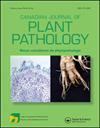Rhizospheric bacteria for use in preventing Fusarium wilt and crown root rot of tomato under natural field conditions
IF 1.6
4区 农林科学
Q3 PLANT SCIENCES
引用次数: 0
Abstract
Abstract Biocontrol, an alternative to chemical control against plant pathogens, may also improve plant health and enhance fruit yield. Tomato production in open fields or greenhouses is constrained by the pathogens Fusarium oxysporum f. sp. lycopersici race 3 (Fol R3) and F. oxysporum f. sp. radicis-lycopersici (Forl). In this work, we studied the biocontrol effect of the antagonistic bacteria Acinetobacter calcoaceticus AcDB3, Bacillus thuringiensis BtMB9, B. subtilis BsTA16, and B. amyloliquefaciens BaMA26 in field trials with four tomato hybrids over two consecutive growing seasons (2019–2020 and 2020–2021). The effect of these bacteria on plant growth was also evaluated. The presence of F. oxysporum in field soil and/or infected plants was confirmed microbiologically. All four bacterial strains significantly suppressed the severity of Fusarium crown and root rot of tomato (FCRRT) and Fusarium wilt symptoms, as well as increased tomato yield under field conditions. Among the four strains, B. subtilis BsTA16 showed the highest reduction in symptoms of Fusarium wilt (68%) and FCRRT (74%). To the best of our knowledge, this is the first report of biological control agents (BCAs) exerting antagonistic activity against both FCRRT caused by Forl and Fusarium wilt caused by Fol in tomato under field conditions.自然田间条件下根际细菌防治番茄枯萎病和根腐病的研究
摘要生物防治是一种替代化学防治植物病原体的方法,也可以改善植物健康,提高果实产量。开阔地或温室中的番茄生产受到病原体镰刀菌(Fusarium oxysporum f.sp.lycopersici race 3)(Fol R3)和镰刀菌f.sp.radicis lycopersisi(Forl)的限制。在这项工作中,我们在连续两个生长季节(2019-2020和2020-2021)对四个番茄杂交种的田间试验中研究了拮抗细菌钙酸不动杆菌AcDB3、苏云金芽孢杆菌BtMB9、枯草芽孢杆菌BsTA16和解淀粉芽孢杆菌BaMA26的生防效果。还评估了这些细菌对植物生长的影响。从微生物学角度证实,在田间土壤和/或受感染的植物中存在尖孢镰刀菌。在田间条件下,这四种菌株都能显著抑制番茄枯萎病的严重程度和枯萎病症状,并提高番茄产量。在这四个菌株中,枯草芽孢杆菌BsTA16表现出最高的枯萎病症状减轻(68%)和FCRRT症状减轻(74%)。据我们所知,这是首次报道生物防治剂(BCAs)在田间条件下对番茄中由福尔引起的FCRRT和由福尔马林引起的枯萎病都具有拮抗活性。
本文章由计算机程序翻译,如有差异,请以英文原文为准。
求助全文
约1分钟内获得全文
求助全文
来源期刊
CiteScore
4.50
自引率
5.00%
发文量
56
审稿时长
6-12 weeks
期刊介绍:
Canadian Journal of Plant Pathology is an international journal which publishes the results of scientific research and other information relevant to the discipline of plant pathology as review papers, research articles, notes and disease reports. Papers may be submitted in English or French and are subject to peer review. Research articles and notes include original research that contributes to the science of plant pathology or to the practice of plant pathology, including the diagnosis, estimation, prevention, and control of plant diseases. Notes are generally shorter in length and include more concise research results. Disease reports are brief, previously unpublished accounts of diseases occurring on a new host or geographic region. Review papers include mini-reviews, descriptions of emerging technologies, and full reviews on a topic of interest to readers, including symposium papers. These papers will be highlighted in each issue of the journal and require prior discussion with the Editor-in-Chief prior to submission.

 求助内容:
求助内容: 应助结果提醒方式:
应助结果提醒方式:


